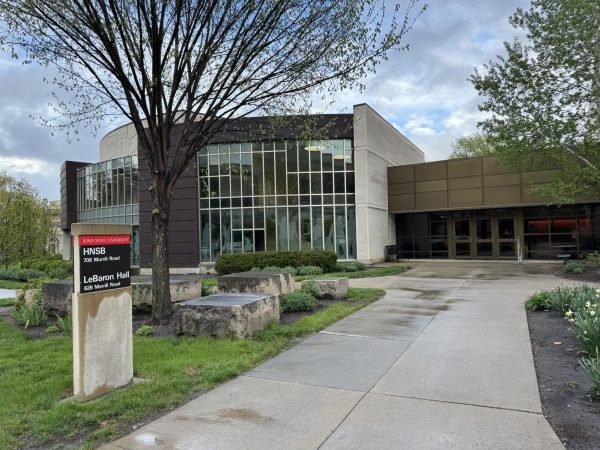Organizations aim to provide ‘normal life’ to Ugandan child soldiers
January 23, 2012
For more than two decades, 30,000 children were forced to become soldiers for the Lord’s Resistance Army, a rebel group based in Northern Uganda. The country has been poverty-stricken and broken since the beginning of a devastating war and is in need of help to ease the physical and physiological damages done to these children.
ChildVoice International, a nonprofit organization based in New Hampshire, is working to reverse these problems. The group’s efforts include working to help alleviate the devastation seen throughout the country by building rehabilitation centers and providing volunteers to Northern Uganda.
Mary Chind, a Pulitzer Prize-winning photographer for The Des Moines Register, and Dr. Neil Mandsager, a Des Moines obstetrician and current board member for ChildVoice International, will present about their recent trip to Uganda as a part of their involvements with ChildVoice International. Their discussion will start at 7 p.m. Tuesday in the Pioneer Room of the Memorial Union. Chind’s photography exhibit, Silent No More: Children of War, is currently located in the Pioneer Room for public viewing.
“The children soldiers in Uganda were faced with an extreme ultimatum, ‘Be soldiers or be killed,'” said Bennett Coffman, president of Hope 4 Africa at ISU and senior in industrial engineering. “Many of these child soldiers were taken to Uganda, and they didn’t really know how to live life because they were physiologically damaged from the instance.
“ChildVoice International is working to help these children get help because they were brainwashed at a young age to kill people.”
Hope 4 Africa is one of the many organizations on campus dedicated to helping not only the children of Uganda, but of all African regions affected by poverty and war.
“The whole underlying mission is to help solve larger-scale problems in Africa by helping to provide a higher education,” Coffman said.
“Children are naive by nature. They are being taken advantage of and abused in Uganda. They don’t understand that there is a better way to live, so it’s our responsibility to show it to them,” said Christine Lim, president of ISUganda and senior in biology. “We raise money to help rebuild the community in Uganda. We give them a place to stay, rebuild schools and make their community more livable.”
ISUganda is a nonprofit schools-for-schools program at Iowa State.
“The children are forced to be in the war and they are sometimes even forced to kill their own parents or brothers and sisters. It is very emotionally not good for the children,” said Nidhi Shah, co-founder of UNICEF at ISU. “It leaves an impression on them. That really harms the physiology of the children and what UNICEF does is try to relieve the children that are victims of this war.”
Charitable organizations try to normalize life for children affected by war and poverty.
“Children are pretty resilient, so they try to give them a normal life by providing schooling, counseling, and coaching,” Shah said. “Many children feel guilty about it, but it’s not their fault and they need that to be explained to them.”
Chind and Mandsager will discuss the importance of helping these children and how their experiences in Uganda affected them.
“I would definitely recommend going upstairs and looking through the photo gallery in the MU,” Coffman said. “It’s really hard to put yourself into the situation when you’re not there, but the pictures do really good justice to the situation.
“They aren’t sad pictures; it makes you feel good that people from Iowa are going halfway across the world to do something to help them. I think that’s really cool to see that with your own eyes.”
Anyone can be involved and make a difference by simply being aware of the situation in Uganda. Shah spoke passionately about why she felt other students needed to be educated and involved with the situation not only in Uganda, but in all poverty-stricken countries.
“I think everyone should be involved because it’s such a violent act,” Coffman said. “If we don’t advocate for these children and don’t do something about it, they will suffer so many consequences of the war and guilt. Every child has the right to food. Every child has the right to survival. Every child has the right to education. If we do not fight for them, who will?
“Something needs to be done. Participate and raise your voice. Children are the future of the world. If you don’t have a secure childhood, how will you have a secure future?”
For further information or ways to get involved, Hope 4 Africa meets at 7 p.m. Tuesdays in the Memorial Union; ISUganda meets at 6 p.m. every other Tuesday in the Memorial Union; and UNICEF at ISU meets at 6 p.m. every Thursday in 1126 Sweeney Hall.
“Come together, raise your voice, bring your ideas, and if you feel passionate about any issues, just be a part,” Shah said. “Being a part of an organization is when you realize how much work is needed and how your contribution is going to help the future of the world.”
















